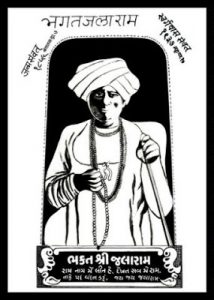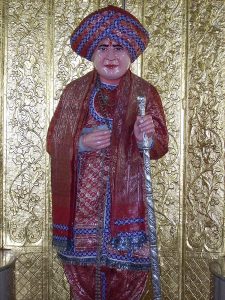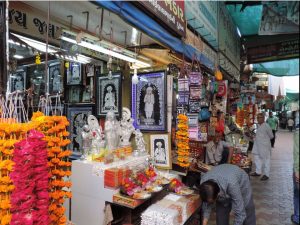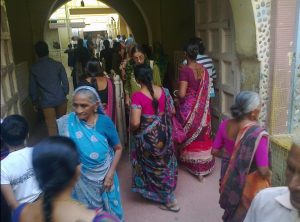 Jalaram Bapa is a saint who lived in a small town of Virpur in Alandi region of Gujarat. Upon meeting his master from a previous life, he commenced namasmrana – repetition of the divine name – and engaged in ceaseless spiritual activity of feeding pilgrims and the poor. An ashram has been erected in his honour, and there are miracles associated with prayer and devotion Jalaram Bapa.
Jalaram Bapa is a saint who lived in a small town of Virpur in Alandi region of Gujarat. Upon meeting his master from a previous life, he commenced namasmrana – repetition of the divine name – and engaged in ceaseless spiritual activity of feeding pilgrims and the poor. An ashram has been erected in his honour, and there are miracles associated with prayer and devotion Jalaram Bapa.
SRI JALARAM BAPA
(1801 – 1882 AD.)
There is no greater meritorious act than feeding the poor and hungy. Actually allaying the hunger of whosoever he be, whether he be rich or poor, is a highly meritorious act indeed. ‘Anna Daataa Sukhee Bhava’ is the Sastraic benediction. That is why in all Indian homes it is the tradition, whether there be sufficient food for the family members or not, but whosoever comes to the house at the meal time, is first fed. Guest is God _ ‘Athidhi Devo Bhava’, it is said. Food is also said to be Brahman ony – it is the giver and sustainer of life. Therefore, feeding all, and especially the poor, is not only a humane but a spiritual act as per Indian thinking.
Virpur in Saurashtra has become very famous today. It was the place of birth of one of the great saints of recent times, namely Sri Jalaram. He had sanctified the place by his devotional and spiritual sadhanas. Feeding the people was one of the routine daily chores in his life, besides his other devotional exercises. He used to delight himself allaying the hunger of people. “It is Narayana, the Lord Himself I am feeding” – that was his bhavana and belief.
As in his own life time, in the Jalaram Ashram at Virpur even today, thousands and thousands of people are fed daily. ‘The kitchen is run there at all times of the day. What is fed there is ‘Prasad’, which not only fills the stomach and nourishes the body, but which also nourishes the soul. This mass-feeding, Jalaram termed by the name – ‘Sada Vrat’ – that is as an all-time and every day duty, which he undertook as his principal Sadhana (spiritual duty, spiritual effort).
His Life

Jalaram was very tender and kind-hearted and his spiritual temperament and tendencies also were apparent and manifest even from his childhood days. He was of a very charitable disposition and because of the limited resources and means of the family, it became a great strain and a difficulty for the family. However much his father tried to restrain him, it was of no avail and the boy continued to dole out things and materials, especially the food grains and food-stuffs, to whosoever came to the door for alms.
There was one significant and miraculous event which took place, when Jalaram was still a child. An old saint came from Ayodhya. He was on his way to the holy Girnar. He called at Pradhan Thakkar’s house and asked Rajabai to bring to him and show him Jalaram, their second child. Even as he was telling this, the child Jalaram came there, leaving his play with his friends nearby, and fell prostrate at the feet of the old Sanyasi. The latter asked Jalaram, “Do you not recognise me, my son?” As the saint said this – in Jalaram’s mental vision – the memory of the whole life of his previous birth flashed itself. His eyes beamed with an expression of recognition of the old saint. He fell at the saint’s feet. After the prostration, by the time he raised himself the old saint was gone. But the link had been forged with his previous life, and the chant of ‘Ram Nam’, which he used to do without any intermission in his previous life, caught up and started on again as unceasingly as his breath.
At his sixteenth year, Jalaram was married. The wife’s name was Virabai. She was also very noble, pious and virtuous person. She was very obedient to her in-laws. But as Jalaram did not seem to become worldly-wise and did not give up his habit of giving charity liberally day in and day out, to whosoever came to the home. His father thought he would ask his son and daughter-in-law to live separately and make his son earn his own livelihood. Jalaram had to therefore leave his father’s home.

Virpur is on the way to Girnar, the holy pilgrimage centre, and all pilgrims and sadhus used to make a halt at Virpur for their food and rest. They used to ask for food and grains at the shops in the village and used to cook their food. One day it so happened, all the other shops were closed. Valaji’s shop alone was open. Hence all the Sadhus (spiritual mendicants) and mendicants called at Valaji’s shop for alms. Jalaram was so delighted to see so many Sadhus come to him. He doled out to them dal, rice, flour, ghee, sugar, oil and many other items, which ever they asked for, as charity. Furthermore, when he saw some of the Sadhus in torn clothes, he gave away new cloth also from the shop. Some of the people of the village, who were jealous and envious of Jalaram because of his uncle’s fondness for him, went and complained to Valaji who became very furious on Jalaram. He came threateningly to the shop. He said he wanted a complete check to be made in the shop of all the things and materials. Jalaram felt frightened and started praying to God to save him from his uncle’s wrath. As the uncle went on checking, every bag was full with the contents, there was no shortage of the cloth even. The uncle was amazed, and instead of taking Jalaram to task. complimented him profusely.
How did the above miracle happen? Only because whatever Jalaram did, he used to say within himself “Iswar-arpanam” (I offer this to God, Iswara). And is it not the duty of God to protect one who has surrendered himself unto Him, and who saw in all but God Alone!
This event had brought a tremendous change in Jalaram’s mind. His spiritual yearning which was dormant in him so far burst forth in a new blaze. It made him completely restless. His uncle noticed this and thought it good and advisable to send him on a pilgrimage to some of the holy places. Jalaram visited Ayodhya, Kasi, Badrinath and several other sacred places. He returned to Virpur after a year and half. But he soon left again and visited Fatehpur and took diksha (blessing) from one saint named Bholaram. He sought also the Guru’s blessings to start ‘Sadavrat’.
Jalaram started the Sadavrat at his 20th year. He just started it with forty measures of grain. The very first guest to his Sadavrat was a saint. The guest~saint blessed Jalaram and gave him the idols of Sri Rama, Lakshman and Sita and told him that he should offer worship to the idols daily. On the third day itself – after Jalaram started the worship of the idols – he got a vision of Hanuman. Jalaram got a temple constructed and installed the idols gifted to him by the saint, along with the idol of Hanuman also. Jalaram was doing the daily worship of the idols till his very last day, with deepest devotion.
For his Sadavrat the inflow of people was increasing day by day. Jalaram’s gentle and hospitable nature, combined with his humility, used to win the admiration of all and his home became a centre of attraction for all. But his means were meagre and limited to meet the ever increasing expenses for the daily mass-feeding of the visitors and pilgrims. He used to work very hard in the field “to make both ends meet”, to keep the “Sadavrata” ever going on without any slackening. But his dependence was more on Lord Sri Rama. Chanting the Divine Name had become his constant and unceasing habit.

Once a hunter came for food. He had in his bag many birds he had killed. As the hunter was sitting with the bag by his side, Jalaram Bapa’s hand stick accidentally touched the bag. Lo! all the dead birds became alive instantly and flew away into the air, into freedom. He cured the paralysis of one Gopal Joshi and cured some blind people also and restored their sight.
Many such miracles began to happen, so naturally and spontaneously that people recognised his ‘divinity’, and began to say “Jala so Allah”
“Jeru ko Na deve Allah
Kisko deve Jala.”
Many became his devotees, and used to serve him, helping in the Sadavrat. Mulubha Thakore, Jamal Saheb and many others who experienced Jalaram’s grace, gave contributions to his Ashram. Whenever there was any shortage in the Ashram, help used to come from unknown sources. His wife always stood by his side with total devotion and used to toil all the time in the Ashram services and kitchen work.
The Maharajah of Dharangadhara presented two big grinding stones for use in the kitchen. They are still there. The Nawab of Junagadh donated some land for the Ashram.
God put Jalaram to many tests too. But he never wavered.
One day an old Sadhu came. He appeared greatly fatigued and tired. Jalaram welcomed him and offered to serve him. The visitor made a strange request. He said “I do not want your food. I have no one to attend to me. If you really want to help, you give away your wife and send her along with me to serve and attend on me.” Jalaram without any hesitation offered his wife to him. The Sadhu left the place along with Virabai. They reached the outskirts of a forest. The Sadhu asked her to wait there for some time and said he had a little work to attend to and would come back soon. He left with her his ‘Danda’ (walking stick) and ‘Kamandal’ (water pot) asking her to keep watch on them while he would be away. As he walked along into the forest, Akash Vani (voice of the Heavens) was heard saying “Virabai, my child! You are a great sati. Your husband Jalaram is matchless in his charity; he excels even Sibi and Karna. He is my dearest devotee. I bless you both always. Go back to your husband, install my Danda and Kamandalu in your Ashram, and worship them. Go on serving your husband and people. That is your worship to me. I shall be ever with you.” The Danda and Kamandalu were installed in Virpur and they are worshipped even now. Jalaram and this wife thus stood the severest test of God, passed through it unscatched and earned the fullest Grace of God.
Jalaram had one daughter. She was married to Bhaktiram of Kotadapil. She had one son Hari Ram.
In the year 1882, on the 25th day of Medha, Jalaram Bapa took his Samadhi. In Virpur there used to be one Tilla Bania who used to always scoff at Jalaram. A legend says that on that particular day, Tilla Bania who did not know of Jalaram’s death, saw Jalaram going seated in a golden chariot. Jalram called out to him to come and join him in the chariot. Tilla Bania felt stunned and dumbfounded. Meanwhile, Jalaram’s golden chariot flew off into the Heaven. Tilla Bania exclaimed, “Jalaram Bapa ascended to Vaikunta. He is God Himself indeed!”
At Virpur, the Sadavrat goes on still, in a most magnificent way.
Jalaram Bapa’s birthday is celebrated on 7th day Shukla paksha of the Hindu month of Kartika as Jalaram Jayanti. It falls on seventh day from Diwali. (This means the date is different each year.)
Jalaram Jayanti festival dates between 2017 & 2027
| Year | Date |
|---|---|
| 2017 | Friday, 27th of October |
| 2018 | Thursday, 15th of November |
| 2019 | Sunday, 3rd of November |
| 2020 | Saturday, 21st of November |
| 2021 | Thursday, 11th of November |
| 2022 | Monday, 31st of October |
| 2023 | Monday, 20th of November |
| 2024 | Friday, 8th of November |
| 2025 | Wednesday, 29th of October |
| 2026 | Monday, 16th of November |
| 2027 | Friday, 5th of November |

![]()

